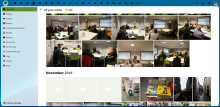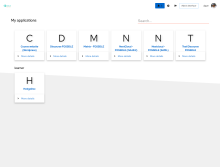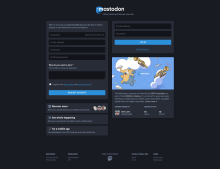Install NextCloud Hub and OnlyOffice on Ubuntu 24.04 with Docker Compose
This is yet another update of my previous posts (installing NextCloud with Collabora Office Online on Ubuntu 16.04 and then NextCloud with OnlyOffice on Ubuntu 18.04 and Install NextCloud Hub and OnlyOffice on Ubuntu 22.04 with Docker Compose). NextCloud continues to develop at a blistering rate, and as of this writing, it's at version 30.0.5.
Updating OER Foundation Web Services for July 2024
It's been over a year since my last update - not too much has changed as far as our technology stack goes, although other aspects of our situation have been rather more volatile.
Paying off technical debt
In recent months, as we wait for the prolonged controversy affecting our shareholder to settle down, at the OER Foundation we've had the opportunity to focus on consolidating our position.
Installing Authentik for Authentication and Single-Sign-On
The OER Foundation offers many Free and Open Source Software services to our learners and educators to provide them with resources for learning, developing Open Educational Resources (OER), and collaborating - both professionally and socially - with one another. Due to this proliferation of 'point source' technologies, users have to create a myriad of user accounts, each requesting an email and password and perhaps a user name.
From FOSS to Libre Software - it's about clarity and values
Any reader of this site will notice that we often talk about 'Free and Open Source Software' which we usually abbreviate as FOSS. For those who aren't intimately familiar with the history, trajectory, and nuances (warning - they are big topics) of the Free Software and Open Source Software camps - both subsets of information technology, itself a subset of digital technology - its significance is both arcane and something of a barrier to understanding.
Creating your own OER Foundation-style Libre Self-hosting Infrastructure with Docker Compose and Ubuntu LTS
[TOC]
Tips for this tutorial
This tutorial is aimed at adventuresome would-be system administrators. I try not to assume any specialised knowledge on your part, and try to provide useful tips and explanation along the way to help you build a valid mental model of what you're doing. At the same, this is not a trivial process. Luckily, if you try it out, and decide not to follow through, so long as you delete your VPS, you should not be out-of-pocket by more than a few cents.
Install NextCloud Hub and OnlyOffice on Ubuntu 22.04 with Docker Compose
'''Update 2025-02-03:''' Here's a new tutorial for Ubuntu 24.04 and NextCloud 30! Consider this older tutorial obsolete (but possibly helpful for people with older systems).
Updating OER Foundation Web Services for February 2023
It's been about six months since my last update and, wow, a lot has changed. The OER Foundation (OERF) has embarked on a new initiative inspired by our old friend the Fediverse and the ramifications to on our sustainability thanks to our newer nemesis, Covid19: the Free and Open Source Software (FOSS) Digital Learning Ecosystem (DLE).
Join the Fediverse: installing Mastodon 4.0 on Ubuntu 22.04 with Docker Compose
In the past week or two, with Elon Musk completing his purchase and take-over of Twitter, there has been a torrent of defections from the centralised, closed, for-profit platform to its antithesis, the Fediverse - it's a portmanteau of "federation" and "universe".
OERu Web Services as of August 2022
In the intervening 17 months since my last update the OER Foundation (OERF) has continued to develop new online services for its global community of learners and educators. All of these services are themselves built with - and hosted on - Free and Open Source Software or FOSS. Each application is the work and responsibility of its own global developer community.




